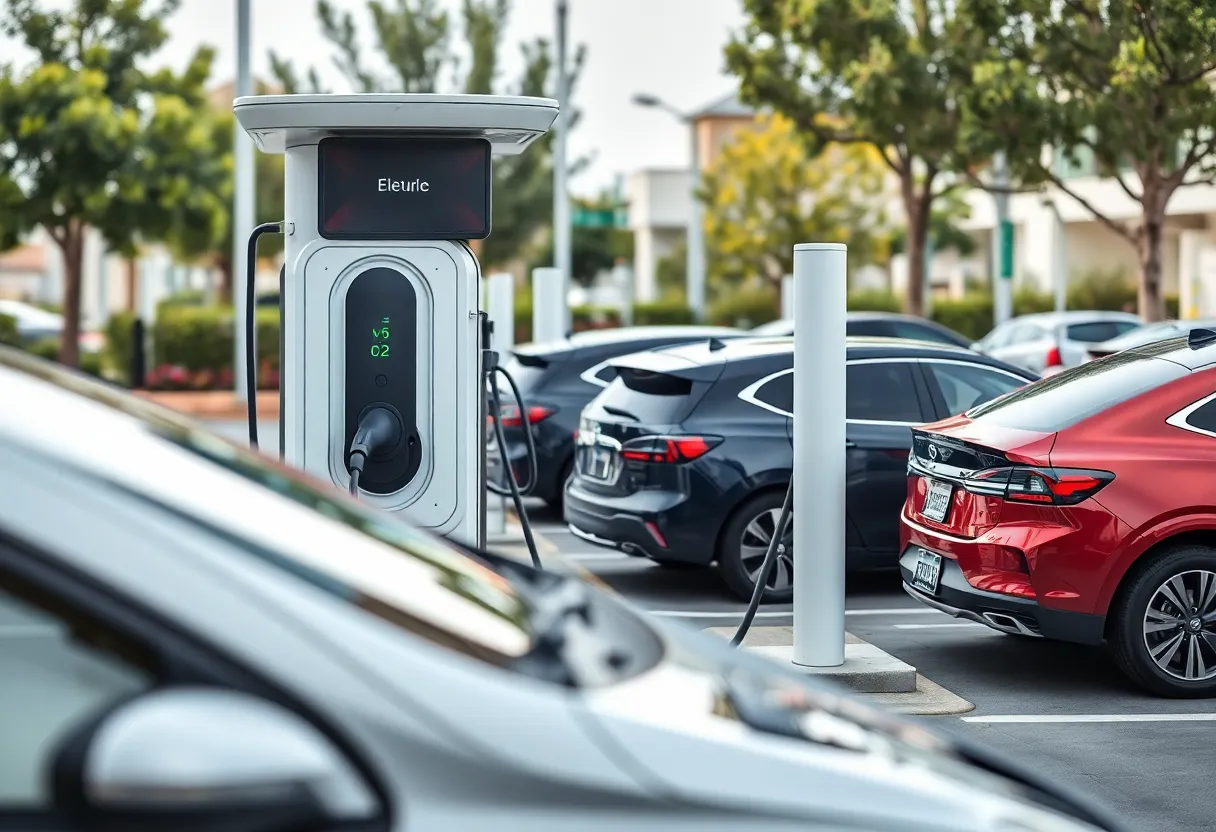News Summary
California has filed a federal lawsuit against the Trump administration with 15 other states, demanding the release of $300 million in funding for electric vehicle chargers. Attorney General Rob Bonta claims the administration is unlawfully withholding funds designated under a bipartisan infrastructure law signed by President Biden. The lawsuit aims to fulfill California’s ambitions for EV infrastructure expansion, essential for combatting climate change and enhancing American innovation in the electric vehicle market.
California has taken a significant legal step by filing a federal lawsuit against the Trump administration to compel the release of billions in funding designated for electric vehicle (EV) chargers under a bipartisan infrastructure law. The lawsuit, filed in conjunction with 15 other states, was announced by California Attorney General Rob Bonta during a news conference held at an EV charging station in Burlingame.
The core of the lawsuit revolves around allegations that President Trump is engaging in unconstitutional behavior by withholding funds that Congress has appropriated for EV infrastructure, specifically the $1.2 trillion bipartisan infrastructure law signed by President Joe Biden in 2021. The complaint argues that the Federal Highway Administration is failing to fulfill its legal obligation to disperse the funds, thereby violating lawful procedures outlined by Congress.
California is poised to receive approximately $300 million earmarked for the construction of EV charging stations through the National Electric Vehicle Infrastructure Program, which is part of Biden’s 2022 Bipartisan Infrastructure Law. However, the current administration has refrained from releasing these critical funds, thus affecting California’s strategic initiatives surrounding electric vehicles.
Governor Gavin Newsom has condemned the withholding of funding as harmful not only to California but also to American innovation and job creation overall. State officials believe such actions are detrimental to efforts aimed at expanding EV infrastructure amidst a marketplace that is rapidly evolving. The lawsuit signifies California’s 19th legal challenge against the federal government under Trump since he took office in January 2017.
The multi-state coalition involved in the lawsuit stretches beyond California to include key states such as Washington, Colorado, Arizona, and New York, amongst others. Together, these states underscore their commitment to tackling the roadblocks presented by the federal government in the pathway of expanding electric vehicle use.
The lawsuit is also reflective of a larger trend. California has been leading advancements in the electric vehicle market, with about 1.3 million registered electric cars as of September, surpassing the totals of Florida and Texas. Additionally, the number of EV charging stations in the state has now exceeded the number of gasoline pumps, highlighting a significant shift in consumer preferences and environmental priorities.
Bonta has stressed the importance of federal investment in supporting California’s ambitious goal of expanding its EV infrastructure, particularly in light of competition from other nations, such as China and Norway, which are making notable progress in the adoption of electric vehicles. California has enacted laws mandating that all new cars and passenger trucks sold in the state be zero-emission by 2035, resulting in an anticipated need for 1.2 million charging stations by 2030 to meet expected demand.
The recent federal decision to freeze funding has raised considerable concerns regarding its impact on California’s ability to fulfill its climate change initiatives. During the early stages of the Trump administration, an executive order was issued that paused funding for projects like the National Electric Vehicle Infrastructure Program, an action that is now being challenged in court.
The lawsuit aims to reassert the authority of Congress in the allocation of funds for essential infrastructure projects, highlighting the separation of powers outlined in the Constitution as fundamental to the legal argument. Officials and environmental advocates argue that any failure to expand the charging infrastructure would pose significant challenges to California’s efforts to reduce greenhouse gas emissions and achieve its climate targets.
Statistics reveal that California has sold nearly two million zero-emission vehicles, representing one-third of all such sales in the United States. As the lawsuit progresses, California officials remain focused on advancing their infrastructure initiatives, even as they navigate the complex dynamics of federal policies under the Trump administration.
In summary, California’s lawsuit against the Trump administration reflects a broader commitment to electric vehicle adoption and environmental sustainability, and underscores the legal obligations of the federal government to support state-led initiatives aimed at combating climate change and promoting innovation.
Deeper Dive: News & Info About This Topic
- Pleasanton Weekly
- Wikipedia: Electric Vehicle
- New York Times
- Google Search: Electric Vehicle Charging Stations lawsuit
- San Francisco Chronicle
- Google Scholar: Electric Vehicle Infrastructure Law
- Politico
- Encyclopedia Britannica: Electric Vehicle

Author: STAFF HERE MISSION VIEJO WRITER
The MISSION VIEJO STAFF WRITER represents the experienced team at HEREMissionViejo.com, your go-to source for actionable local news and information in Mission Viejo, Orange County, and beyond. Specializing in "news you can use," we cover essential topics like product reviews for personal and business needs, local business directories, politics, real estate trends, neighborhood insights, and state news affecting the area—with deep expertise drawn from years of dedicated reporting and strong community input, including local press releases and business updates. We deliver top reporting on high-value events such as Oso Fit 5K Fun Run and Community Health Fair, Walk Against Drugs & Community Fair, and National Night Out. Our coverage extends to key organizations like the Mission Viejo Chamber of Commerce and Providence Mission Hospital Mission Viejo, plus leading businesses in retail and education that power the local economy such as The Shops at Mission Viejo, Capistrano Unified School District, and Amazon Delivery Station. As part of the broader HERE network, including HEREAnaheim.com, HEREBeverlyHills.com, HERECostaMesa.com, HERECoronado.com, HEREHollywood.com, HEREHuntingtonBeach.com, HERELongBeach.com, HERELosAngeles.com, HERESanDiego.com, and HERESantaAna.com, we provide comprehensive, credible insights into California's dynamic landscape.


